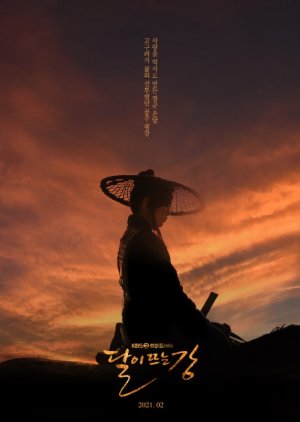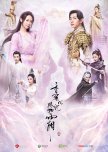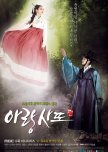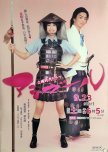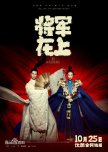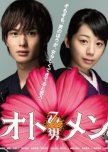
Was this review helpful to you?

Bloodshed And History ; Where To Begin With One Of The Most Controversial Dramas Of 2021...
Before getting on to analysing the main storyline and characters of the series as individuals , it is probably most prominent to address two main controversies which ultimately affected character and production in the drama. First, dropping initial actor Ji Soo with his allegations in favour of Na In Woo in episode 7 ( subverting On Dal’s personality ) and then having to reshoot scenes eventually with Na In Woo and releasing the earlier episodes after the initial finale . Whilst a lot of diehard advocates of the show will probably sugarcoat this by stating that “ it didn’t stop the storyline from being good” or “ Kim So Hyun made up for this”, it is important to note that even in early episodes, the series did often feel hampered by several incoherent screenwriting choices.A notable example of poor scriptwriting occurs by the usage of contemporary vernacular in the show’s main setting of the Goguryeo era (37BC – 668AD). Although admittedly it would be equally ridiculous for the show to even attempt speaking in an outdated and incomprehensible tongue for the whole course of the series, it felt laughable when a palace guard or a member of the royal court suddenly sprouted demotic Korean phrases that would not be out of place in an Internet cafe in Seoul today. Of course, it is understandable that the drama does want to resonate with modern audiences, and as a fictionalised story, tweaking history can present an interesting depiction of the director and screenwriter’s thoughts. However, instead of actually bothering to take the time to present authenticity through discourse exchanges, some of the spoken lines of the series felt awkwardly mismatched with its time and setting. ( Though admittedly this did improve in later episodes.)
As a consequence, this often took away from the more intriguing portrayal of the historical costumes , and the storyline ‘s main focus on a warring nation torn by clans. The premise is fairly intriguing by its initial setup of the amnesiac heroine Princess Pyeonggang ( Kim So-hyun) defying her fate , falling in love with “the fool” On Dal ( Ji Soo/ Na In Woo) and of course taking its origins from a modern spin on the traditional folktale based on the 2010 novel Princess Pyeonggang (written by Choi Sa-gyu).
Nevertheless, Kim So-Hyun is able to brilliantly capture Pyeonggang ( or “ Ga Jin”) through her individual performance , however, something which should initially be addressed as an example of questionable miscasting, was the choice also to use So-Hyun to play her character’s mother, Queen Yeon during flashbacks in early episodes. ( Leading to a lot of confusion for first-time viewers of the show.)
In addition to this whilst it is hard to fault Kim So Hyun’s performance, her character felt oddly-written. When we are first introduced to Ga Jin she is a ‘’blank slate’’ due to not possessing defining memories of her past. However, the main issue towards Pyeonggang is due to her character development as the story progresses. We were told that Pyeonggang grew up as a top assassin Yeom Ga-jin, which implied that she should not only be skilled in martial arts, but also would be able to be quick-thinking in dire situations. Yet often during key events in the series, Ga Jin/ Pyeonggang was often reckless and foolish. Near the ending, admittedly Pyeonggang did resort back to her resilient and tough role as the heroine, however, the development in between deeply questioned how such a fierce, decisive and brave warrior from the flash-forward during the opening montage matched up with the character who seemed to unfold over the course of the series in front of viewers’ eyes.
This moves us onto the biggest elephant in the room, On Dal. Being played by two different actors, there is the most evident problem of how to assess this character from the two difference performances upon the archetype of the ‘ kind-hearted and foolish male lead’.
Ji Soo seemed to capture the ‘ fool’ as benign and goofy, adding a notably fractious and eccentric undertone to On Dal as a character. However, Na In Woo took a less childish approach to On Dal’s constant grins and confused tone , through dumbstruck expressions for the latter part of the series before taking on a more serious tone towards the character (as he is becomes a more revered individual due to the circumstances ). Regardless, On Dal acts as a major asset within Pyeonggang’s journey of self discovery and their fairly sweet romance tale by bringing out her personality and as a tie to her complicated past. However, the problem still remains not merely by the different performances of On Dal for viewers , but trying to flesh-out On-Dal as a sentient character.
In fact, this was an evident problem between how the show dedicated time to sketching out the drama’s personae , but it’s hard to really “ grasp” or feel intricate emotional attachment towards most of them. The early episodes of the drama enjoyed using the stock side characters of the village as comic relief, before in the second half and the time-skip bringing in a multitude of either newly introduced or previously mentioned antagonists and characters . (Whilst many of these characters and villains were incredibly interesting , they often struggled to have decent screen time in order to develop out of their one-dimensional shell.)
Perhaps the one character in the show who was surprisingly quite intriguing in the beginning of the series was General Go Geon ( Lee Ji Hoon). As it may seem evident through tropes, Go Geon naturally becomes the ‘ second love interest’ through his ‘ complicated’ feelings with Ga-Jin. However, whilst Go Geon did surprisingly possess the potential role as an an intriguingly motivated anti-hero in the series, his role ( without any spoilers) was sadly blanked out due to poor character development.
The ending was predictable to say the least and arguably anticlimactic by straying away from the actual conclusion of the renowned tale. Of course, this is a fictionalised drama and having an artistic license is not inherently wrong. However, the ending may cause a little bit of head scratching for viewers by ( the change of actors for On Dal aside) the entire flashforward , weather and certain events being subverted entirely. In addition to this, the ending felt more like a ” quick-fix”, than being built upon strong foundations by the slow-paced storyline (in parts ) diminishing often the more intriguing elements of the drama.
So, is ” A Moon Where The River Rises” being unfairly criticised, or is it genuinely a good watch? Controversies aside, whilst the aesthetic cinematography, a high-budget production value ( especially remaining apparent with its CGI and beautiful outfits) and Kim So Hyun ’s brilliant performance remained compelling enticements towards watching the drama, ” River Where The Moon Rises" suffered ultimately from whimsical screenwriting. Intriguing characters and villains often felt half-baked, the overused tropes in the first-half of the series often made the second-half struggle to catch-up with the more intriguing elements of the storyline ( resulting in slow-pacing also ) and the ending felt rushed to say the least. Ultimately, ” River Where The Moon Rises” isn’t a dire or terrible drama and certainly does have some redeemable qualities , however, there are better sageuks ( historical dramas) out there with stronger plots, more three-dimensional characters and well-written endings also.
Was this review helpful to you?

Now for the elephant in the room...the lead actor changed after 6 episodes. Some people were upset about it and could not adjust to the change. For this reason, I highly suggest taking a break after episode 6 instead of watching episodes 6 and 7 back to back. The editing gets a bit sloppy around this point because they had to go back and refilm scenes with the new actor. The story's focus moves away from the male lead and onto the princess. Just think of it as the drama's slump period. So now the audience is forced to experience two different actors with two different character interpretations. It's very hard not to compare the two. I personally liked Na In Woo's interpretation better as the character is supposed to be a country bumpkin and soft. The princess's nickname for On Dal is "deer" and it seemed to me like Na In Woo had more doe like eyes. This innocence is of key importance in later episodes. Anyways, I have to give Na In Woo props cuz he came in and took on a role he had very little time to prepare for and got so much hate for it because he replaced the predecessor.
As for the story, there was a lot going on and maybe the drama tried to tackle too much at once? Not only do you have the internal palace drama and corruption, you have neighboring country threats, as well a bunch of people with their own side stories trying to get revenge. I wouldn't say the story dragged since there was a lot going on, but 20 episodes felt like a lot and it could've been shortened down to 16. At times the script felt a bit weak when it came to dialogue and flat supporting characters. Overall, not an absolute mess like I thought it would be. If you give the drama a chance, it does get better in the second half. It's a decent drama. I can't say for sure it was worth my time though.
Was this review helpful to you?

the cast is the only thing that saved this drama
I'm just going to dive right in and say this drama was a hot mess from start to finish.None of the characters' choices were consistent nor was there much character development for any of the characters except for On Dal and Ga Jin. Everyone kept making supposedly "cunning" choices but in the end, they were all so stupid. The pacing of the story was awful and they shoved so many different plots into this drama that made it hard to follow or hard to care about any one of them.
To be quite frank, the only thing that saved this drama from being worse is the cast. Everyone performed their parts extraordinarily well and they made a mediocre story somewhat watchable. And the truth is On Dal and Ga Jin's love story was beautiful and I did love/enjoy watching their relationship unfold, face trials and tribulations, and develop over the course of the drama. They were the only silver lining in an abysmally set up story.
I don't know if I'd recommend it though. Maybe if you skim everything else and just watch only On Dal and Ga Jin's scenes. Will you be confused? Sure. But I watched every episode and I was confused for most of it, so it wouldn't be much of a difference.
Was this review helpful to you?

This review may contain spoilers
The Moon truly does rise where the River is
Acting and Characters: Kim So Hyun was absolutely perfect as Pyeonggang. Na In Woo took on the difficult job of filling in On Dal after Ji Soo got dropped and exceeded all expectations. Lee Ji Hoon was the swoony SML that we grew to love and hate. Choi Yu Hwa did an amazing job portraying a cunning yet kind-hearted Silla spy. The side characters were all so lovable. Pung Gae and Jin were so cute. The Queen and Go Won Pyo were extremely well portrayed. Won (or King Yeongyang) was lovable as a teen and despised as an adult. King Pyeongwon was a character that we grew to love over the course of the show.Plot: The plot was iffy at times but it was bearable. It didn't help that they rush a couple of episodes and write a whole new set of episodes due to the allegations around Ji Soo. Overall I think they did a really good job of sticking to the history and folktale while giving us the viewers some fanservice with that ending. They did Geon and Won (or King Yeongyang) dirty in the latter half of the show, but at least we got their true character back by the end. The "death" of On Dal was kind of unnecessary but I get why they did it. They needed to stay somewhat true to the ending of the folktale.
OST and Cinematography: OST was amazing. The soundtracks used for the battle scenes so perfectly. The main OST was lovely. The cinematography was absolutely stunning at times. One of the better cinematographies I've seen. The setting for the scenes was absolutely beautiful. The camerawork was pretty good. Overall a very well-produced show given the circumstances.
Final Score: 9/10
Was this review helpful to you?

This review may contain spoilers
I'm not sure how I feel about this but it was one hell of a ride
On Dal is truly one of the purest, fluffiest, sweetest, cutest, funniest, awkward, most adorable male leads ever. I truly fell in love with this character. He's truly the softest General out there. Nothing but love for this man.I was like I'm getting this nasty feeling that cutesy San is gonna die before he can make up with his sister and then he did and I was like BITCH WHAT THE FUCK!!!! I'm quite sad that San died, I really liked him.
OMG OMG OMG THAT CONCUBINE IS EVERYTHING. She is truly the most pure, sweetest person out there. I think she hss become my favourite character (yes I even love her more than Dal, Wol, and Jin who are some of my faves and babes too). I truly want to marry that concubine, SHE IS JUST SO DARN PRECIOUS! Nothing but love for this lady. She truly stole the show and is one of River Where The Moon Rises most underrated characters.
I also love the my ship came true. I was like omggg Go Geon and Mo Young would work so well together, like my two scheming babies and when they officially became a thing I died.
I however DO NOT LIKE how Jin and Poong Gae had the slowest of slow slowburn romance. I wish they became an official thing way sooner since by the end of episode 17 THEY'RE STILL NOT FUCKING TOGETHER WHILE EVERYONE AND THEIR MOTHER KNOWS THEY LIKE EACH OTHER!
I also really liked Ga Jin in the beginning but kind of started to dislike her halfway through the series. I didn't like some of the decisions made when she, On Dal and their friends returned from their battle victory and where reinstated. She kind of not only neglected her supposedly best friend but also the person she loved most which was On Dal. I don't really hate her, but I'm not overly supporting her like I used to do in the beginning. I do have to say I fucking love how much of a badass she is and how amazing it is to see her fighting. I never expected Kim So Hyun to be this good at action scenes but man she really out did herself with this drama. I'm truly impressed by her performance since she acted really well despite the fact that she filmed this drama twice.
I kind of REALLY hate where the plot of river where the moon rises went and is going. Just like my friend said: dem rating is really, truly dropping. I initially would have given this a 9 out of 10, then it went from a 9 to a 8, and now I'm feeling it's more of a 7 than a 8. But the positive news is that I do officially stan the actor that replaced jisoo, which is na in woo. DUDE LITERALLY FILMED THIS FOR 5 WEEKS AND IT HAS 20 EPISODES WHILE SIMULTANEOUSLY FILMING A MOVIE TOO. He shot for this kdrama between 20 up to 40 scenes a day and even went on to a film's set when he was done with filming his scenes for River where the moon rises. Baby truly got no sleep, but performed so fucking well. He even met the director of the drama and had like an outfit fitting one evening and the next day he started filming right away without even really having time to learn the script BUT HE ACTS AND PORTRAYS THE ROLE SOOO FREAKING WELL. I hated his character in Mr. Queen since he's the typical second male lead of historical dramas THAT I DESPISE but here he is such a awkward funny idiot uwu person, like the complete opposite of his Mr. Queen character. I honestly think that this character didn't really fit Jisoo if I look at his other roles and acting credits. This On Dal is such a sweet pea funny awkward mushroom of a person. I dunno if they fully changed it so it would match Na In Woo better, but honestly I love this version of that historical figure and can't really imagining Jisoo pulling this character off like Na In Woo did and this is coming from a former Jisoo stanner who I do not hate but also don't fully support anymore. It is still truly amazing how well Na In Woo acted since my jaw has officially dropped like 50 times by now. I 100% understand why the director was like I NEEEED TO WORK WITH THIS MAIN AGAIN because honestly who wouldn't after this performance and dedication? There were a lot of adlibs added too but honestly you don't even know which ones aren't and which are but I repeat he played the character sooo well. I'm also amazed at the chemistry between him and Kim So Hyun, and I have nothing but praise and love for the cast/actors, director, producers and anyone else since it's really amazing what they managed to make and with how they had to reshoot so much. Despite me not loving where this plot is going and went I do truly think that everyone BUT THE WRITER deserves the praise for how well this turned out. I'm just really impressed with the end result and how much work everyone put into it so that it could still be airing on our screens. Besides, some of the actors, including the second male lead, even refused to receive payments for the reshoots which is really admirable too. But enough gushing about everyone else, let's get back to my thoughts and feelings about the plot.
Why did they just assasinate both Ga Jin's character, which has been going on for so long, but also the cute younger brother's character??? I'm seriously wondering why they chose to do that? I also FUCKING HATE, LOATHE, DISLIKE the whole fucking 4 years later...... I will never like how writers of kdramas keep doing that many years later. I do not like it when this happens in my precious kdramas.
Omggg Jin and Poong Gae are finally together and they're even married now. The 4 year gap was at least good for something.
I was like I don't like where anyone's story is going. I don't like where On Dal's and Ga Jin's story went, the same goes for the younger brother turned king, and general go geon and the store owners story. I DON'T LIKE WHERE IT IS GOING!!!! Only Poong Gae and Jin were the light in the dark.
I'M AAAAAAAANNOYED fucking A N N O Y E D! I'm stuck with it for another 40 minutes, kill me now pls. And I know I will be more annoyed since they'll do like A FUCKING SECOND AMNESIA PLOT, which I wish I could laugh about like my friends but I can't.
I only have 40 minutes left and then I can put it behind me for forever, which is really sad because it started out so strong. Poong Gae abd Jin are truly carrying the whole show on their backs. If anything happens to Poong Gae I will fucking rage.
25 MINUTES LEFT :"( And I'm not crying because I don't want it to end. I WANT IT TO END.
And I'm like SERIOUSLY? TWO AMNESIA PLOTS? I MEAN C'MON.......
OMG LOL I'M DYING DUDE GOT PIERCED BY 6 OR 8 ARROWS AND WILL IN THE END HAVE AMNESIA AND STILL SURVIVE. What is this kind of unrealistic unnecessary sorcery. Still better than him actually dying, that would have made me really made. This is at least too ridiculous that I'm not angry.
OMG I NOW KNOW WHY THEY PUT THAT PART OF HIS MASTER PRETENDING TO DIE AS A NOT SO SUBTLE HINT HE DID THE SAME AND AIN'T DEAD EITHER, LOOOOOL
IT IS NOT OKAY HOW THEY SUDDENLY RECTIFY SOME OF THEIR MISTAKES. They made the show epic, then butchered it and butchered it some more, and now suddenly they put some epic moments towards the end again. STOP FOCUSING ME PLS I BEG YOU. I do have to say that monk is fucking funny and underrated as hell.
In the end it's still a 7 because the beginning was so good, like really good and I liked how they managed to redeem Go Geon & younger bro in the end. I will, however, not recommend this, sadly.
Was this review helpful to you?

All the ingredients were there, but it failed to live up to its epic potential
I accepted rather early on (around episode 3 or 4) that this would probably turn out to be a rather mediocre sageuk, but even so I enjoyed it quite a bit, and even had a lot of affection for it … until the last episode made my goodwill evaporate, which has impelled me to lower the (in my estimation generous) 7.5 rating I was planning to give this drama to a 6.5 (which, honestly, still may be rather generous).I think it’s quite clear that this drama hoped to follow in the footsteps of Queen Seondeok and Empress Ki, to become the next epic historical drama led by a strong female character, liberally interpreting the life of a famous historical woman. Pyeonggang’s characterization is markedly similar to Empress Ki’s Nyang, while the overall progression of the story almost seems modeled off of Queen Seondeok. Though neither of those dramas was perfect, River Where the Moon Rises unfortunately fell short of the mark they were aiming for. The problems with this drama largely stem from the writing, which really isn’t surprising, considering that Dr. Jin is the only sageuk Han Ji Hoon has previously written. As I have not read the novel from which this drama was adapted, I cannot say how many of these issues were present in the source material, but certainly they did not stem from the original folktale recorded in the Samguk sagi. Still, I will start by discussing the positive aspects of this drama, which indicate that it probably did have the potential to join some of those classic epics, had it not gone so far astray in other respects.
Though there was nothing particularly outstanding about Yoon Sang Ho’s directing, it was perfectly serviceable and evoked the classic sageuk style quite well. This drama definitely had its moments that were genuinely exciting, epic, and moving (even if it didn’t manage to make me cry). The cinematography and the production design are definite stand outs. The natural scenery was gorgeous (this drama has some of the most amazing landscape shots I’ve seen in any drama) and the ancient cityscapes looked great. Some sets are a bit better than others, but overall they were very appealing, with striking colors (and sometimes lighting) as well as well-conceived choices of decor. While I do have some complaints about some of the whatever-the-designer-thinks-is-cool costumes, there were also many beautiful ones.
The music was both a strength and a weakness of this production, though the scale leans far more towards the former. The songs were not terribly memorable to me, but there were some nice classic ballads. There were also some more contemporary-sounding additions, but they were hardly used in the actual drama (generally they played during the credits), so thankfully this drama largely avoided the trend of using jarringly current music that feels incongruous with the historical setting. However, where the soundtrack really shined was in the instrumental (and sometimes choral) pieces, which were often quite beautiful. Where it detracted was in the tendency to overdo it with the dramatic music. Of course, I cannot think of a single sageuk that isn’t guilty of this, so I suppose I should give it a pass on that respect.
The battle scenes are reasonably well-executed. Though there are a few shots that are not entirely convincing, and it is clear that sometimes the armies are smaller than they are said to be, overall, they’ve done quite a good job filming the battles in such a way as to obscure rather than emphasize the weaknesses. I did feel that, for a drama about a great general, there is relatively little focus on the action scenes. This may be due to budget constraints necessitating rather short battle sequences. However, even smaller fight sequences are not very emphasized. This is to say, that while the execution of the actions scenes is not lacking in a way to detract from the drama, you shouldn’t come to this expecting a martial arts extravaganza.
Now, onto the story … The first five episodes exist mainly to get the romance started and give the heroine a “cool” backstory, so it takes about six episodes for the real political plot to get started. This is unfortunate since there was nothing very memorable about how the romance was set up (there’s no reason it couldn’t have been written differently and still be equally, if not more, compelling), nor was her backstory very well-executed, so it does feel like the politics of the early episodes were sacrificed for nothing. Thankfully the politics get better as the drama refocuses on the court, though the problems do not entirely disappear.
The main strength of the plot lies in the general set-up of the politics. Many dramas have 2-3 main political actors, while all supporting characters are mindless pawns in their game. In this drama, though there were around 3 (maybe 4, depending on who you count) main sides to the conflict, many of the supporting characters were independent political actors, who had their own motives and ambitions and were willing to switch sides, play both sides, or fake alliances as it suited them. Some of them also had changes of heart or circumstance. Thus, it was actually rather difficult to predict what role all these characters would play and where they would end up aligned by the end. The result is that the overall outline of the politics is much more interesting and complex than most historical dramas.
However, sometimes it felt like just that, an outline. The actual execution of the politics was often rushed and simplified. Sometimes plot arcs seemed to be resolved almost as soon as they had begun, resulting in momentous events lacking impact. I felt that many plot arcs needed to be longer or otherwise more fleshed-out. This is an issue that plagued the depiction of the characters as well at times. Though many of them were reasonably interesting, had more time been spent on their development, there was the potential for them to be more so. A more detailed portrayal also could have helped to make some of the shifts in their personalities and relationships seem more nuanced and less sudden. This also may be why it sometimes seemed this drama had pacing problems, since it was trying to balance taking enough time to establish aspects of the characters and relationships with the very rapid progression of events … the results were mixed.
The second main issue with how the politics were written is due to the way the story at times is obviously manipulated in service of making the heroine look good. For starters, we have the very standard sageuk device (which I’m not particularly fond of), oft used to shine the spotlight on princes and princesses alike, of making said young royal’s father (the king) largely useless, lest he overshadow his progeny. Pyeonggang’s brother suffers from this to a certain extent as well, and while I stand by what I said about there being many characters with independent political motivations and agency, this is mostly true of the characters not so closely aligned with Pyeonggang, because if her allies were given more focus or had independent thoughts, they might run the risk of stealing her thunder. Though I think minimizing these characters to make the protagonist shine is certainly not ideal writing, it’s so common it might not be worth complaining about except that this drama went well beyond the typical pathetic king trope. Pyeonggang wins fights that realistically she should lose, because, hey, she’s the heroine, so she has to win. Other characters make conveniently illogical decisions just to move her into the situations the writer wants her character to end up in. The Silla king is overly concerned about her, which seems to be an attempt to inflate the impression of her importance. Considering that Silla didn’t conquer Goguryeo for another century after these events (and they enlisted the help of Tang to do so), are we really supposed to watch with a straight face while Jinheung acts like this one princess is the main obstacle standing between Silla and the unification of the Three Kingdoms? They even attributed a major military victory to Pyeonggang's actions, which were, frankly, incredibly stupid and would have ended in disaster had other characters not intervened. These are the sorts of things that undermined the credibility of the politics and made it hard to take this drama seriously as a historical epic
What is particularly frustrating about this is that even after bending so much of the writing around the heroine, she ended up being the least compelling and least well-characterized of the leads. Initially when I found myself not drawn to Pyeonggang’s character, I thought it might be due to my bias against warrior princesses (I consider it an annoyingly overused trope, though Éowyn will always be awesome), so I tried to hold off judgement. Around episode 5, I thought she was beginning to grow on me, but it didn’t really last. Eventually, I came to realize that the real problem with the character was her inconsistency. Sometimes she would carefully plan out clever schemes, but at others she was mind-bogglingly impulsive and stupid. They seemed to want to portray her as being ruthless, but we never actually see her do anything particularly ruthless. Moreover, I felt that the way the drama dealt with her character conflicts and development was rushed and poorly-communicated, thus lacked weight. Though it is true of many of the characters suffer from this at points, I think it particularly bad in her case, partly because she undergoes much of her development very rapidly in the early episodes. I also have to say I often found Pyeonggang to be a bit lacking in personality and sometimes just not terribly likable.
To make matters worse, I was actually rather disappointed by Kim So Hyun’s performance, especially considering she was one of the main reasons I watched this drama. I did like her portrayal in some of the softer romantic scenes, but I don’t think she really had a strong enough presence for the commanding ones. Basically I think she’s more suited to a lovely Joseon princess-type character than the 2021 version of Queen Seondeok or Empress Ki.
For me Na In Woo and Lee Ji Hoon stole the show from Kim So Hyun. I found her lack of charisma particularly apparent when standing beside Na In Woo, who turned out to be a very pleasant surprise. Since the first six episodes have been reshot, I will not comment on Ji Soo’s performance except to say that Na In Woo was a definite upgrade. I had never even heard of Na In Woo before he replaced Ji Soo. Though I wasn’t immediately taken with him, he began to grow on me and by the end I found him to be the most compelling actor in the drama (aside from Kang Ha Neul, whose brief appearances were quite impactful). Though I do think Na In Woo has a tendency to over-exaggerate his expressions, he was convincing both in the sweetness of the character’s cheerful, good-natured “foolishness” and in the gravity of a battle-hardened general leading thousands of men. He also brought a softness and sincerity to the character in the romantic scenes. On Dal might not be the most fascinating character, but he seemed to have the most well-rounded portrayal and the most multifaceted personality. His development and conflicts also did not suffer from the muddled characterization that Pyeonggang’s did, though some more in depth exploration of some of these aspects wouldn't have hurt. I do wish the story had treated his character differently, particularly in how his motivations and even his role as general were portrayed. At first I wrote off my issues with this as a matter of personal taste, that is until it all culminated in a downright disgraceful ending for his character (which, along with some other stupidity in the last episode, is what led me to drop my rating).
Lee Ji Hoon was one of the stronger aspects of this drama from the start and remained so throughout the drama. Go Geon was one of the drama’s more interesting characters and while I can’t say I was entirely surprised by all his developments, since I did see the biggest transformation coming from a couple episodes out, his character definitely didn’t end up as I had expected at the start. I felt that the later episodes did some disservice to the character, but again this is the fault of the writing, not Lee Ji Hoon’s portrayal (which was one of the few good things about the last episode). I don’t have much to say regarding Mo Yong or Choi Yoo Hwa, either positive or negative. Her performance was fine and I liked the character, but I don’t think she was one of the aspects that really stood out.
Among the supporting cast, I consider Lee Hae Young to be a particularly good casting choice. I’ve seen enough power-hungry nobles portrayed by sneering old men, thus I really appreciated seeing a good-looking and relatively young man in such a role for a change. They also managed to give his character a couple dimensions other than political ambition, which distinguished him somewhat from the stock sageuk villain. It would not have been difficult to imagine this character as a great leader if he hadn’t been written as the antagonist.
Overall, I’m not sure whether to recommend this drama. If you like classic-style sageuks, this one isn’t too bad, though it can’t be said to be notable either. It has romance, politics, and battles, all presented with particularly stunning visuals and some pretty good performances. However, I have rarely been so upset by an ending and the writing is messy to say the least. It’s unfortunate that it wasn’t better, especially since Three Kingdoms period epics are so rare.
Was this review helpful to you?

Beautiful drama
The cinematography, the casting, the acting, the story, the OST is spot on. I think Na In Woo has fully grasped the spirit of the good natured and great On Dal. I began this drama, casually, not really sure if I wanted to see it. I binged the first 8 episodes. Waited patiently for Episode 9 as I was really looking forward to Na In Woo's performance. I have finished episode 10 and I can not wait to see the next episode. He had a much bigger role, and I loved every minute of it. The pure, simple, child-like nature came through, along with his chemistry with Kim So Hyun is wonderful to watch. Speaking of chemistry... Lee Ji Hoon and Choi Yoo Hwa chemistry is out of this world. Highly recommended.The whole cast deserves applause for the hardship they had to go through and despite that, they nailed it. The flaming is unwarranted in my opinion. Many from "new accounts" too.
Was this review helpful to you?

This review may contain spoilers
In terms of acting, production, storyline everything is close to being perfect. The story of a simple love story of a fool On dal and a princess recreated into a powerful story about power and sacrifice. the story progress steadily and gradually. The battle scenes were exceptionally good and quite interesting to watch. In short, rationally speaking this is a good drama.About replacing Ji soo with Na in woo, although I initially found it disturbing but later came to the conclusion that Na in woo was a better choice after all and the actor did an amazing job of portraying our lead character on dal.
But truthfully the first thing that came into my mind by the 20th episode is "thank god it's finally over!!". For me, this is emotionally exhausting. River where the moon rises is about a fight between clans for the throne. In the midst of it is a princess who uses the love and devotion of her lover and wields it as a knife for power and personal revenge. Princess Pyeong Gang never cared for the people. instead, she used on dal and his entire clan for personal revenge and to keep her family in power. in the process not only on dal lost his mother but also many others, only for it to all end up with her a**hole of a brother to sit on the throne. To use peace for the 3 kingdoms as justification, the process was too acute to accept. I guess this is where the word ambitious princess comes in.
What was even more depressing is that while caught up in the power game she completely ignored On Dal on several occasions and refuse to notice his suffering. When he finally left is when she regrets it.
Here every character in the story is driven by a personal vendetta while sugar-coating it as love and sacrifice and I found this emotionally exhausting.
Was this review helpful to you?

This review may contain spoilers
The moon shines as the river flows
River Where the Moon Rises is an adaptation of the novel “Princess Pyeonggang” (평강공주) by Choi Sa Gyu (최사규), which is a romanticized interpretation of the love story between Princess Pyeonggang and On Dal, characters in a classic Goguryeo folktale entitled Pyeonggang and Ondal.The timeline is set during the late 6th century, in an era when the 3 ancient kingdoms of Goguryeo, Silla and Baekje were at war with one another, while facing the looming threat of invasion by the neighbouring Northern Zhou of ancient China’s Northern Dynasties. Certain historical events as recorded in the Samguk Sagi (History of the Three Kingdoms) are incorporated into the overall setting. It is directed by Yoon Sang Ho who has extensive experience in sageuk notably with King Maker: The Change of Destiny, Saimdang Light’s Diary and his first Goguryeo drama, The Legend.
Initially beset by controversy due to a scandal involving its lead actor, Kim Ji Soo, the production team reacted swiftly by replacing him with Na In Woo from episode 7 onwards, although about 80% of the production had reportedly been completed. Fortunately the drama continued with only a brief delay in its airing schedule and the producers even decided to re-shoot the earlier episodes with Na In Woo in order to preserve the continuity of the story flow as well as for marketing and distribution purposes.
RWTMR is a dramatic sageuk that features decent production values, an engrossing plot, impressive cinematography and art direction. Through usage of cinematic colour grading, the scenery shots are absolutely breathtaking. The equally outstanding set designs provide an authentic depiction of the Goguryeo era, which appear markedly different from the usual Joseon settings. The characters are compellingly portrayed for the most part and, although by no means a sweeping epic, the finale itself certainly is, in every sense of the word. This engaging sageuk is presented in 20 episodes and headlined by a talented young cast.
The drama takes its time to meticulously chronicle how Pyeonggang and On Dal fall in love with each other and grow together to become the power couple of Goguryeo. It thoroughly explores the themes of family, friendship, loyalty, betrayal, revenge and love. There is no shortage of action, adventure, court intrigue and melodrama. The politics and schemes are not overly complicated or convoluted, while the action involves a combination of large-scale battles between opposing armies as well as concentrated sword fights and individual duels. The swordplay choreography is somewhat lacking (this isn’t up to the standard of Six Flying Dragons) but the battle scenes do not disappoint.
The pacing of the storytelling is somewhat uneven, particularly at the midway point where certain plotlines play out longer than necessary. Most notably the love triangle involving Pyeonggang, On Dal and Go Geon. The story arc concerning On Dal’s foster mother as well as the Sonno tribe village scenes prolonged a fair bit. The infusion of light-hearted comedic moments feel forced and out of place at times, especially involving the interactions between the characters of Sa Poong Gae, Tara Jin, Tara San, and the child Wol Yi. The drama does conclude in an extremely thrilling fashion where the final 4 episodes in particular are inundated with numerous action sequences and the closure of several story arcs.
The development of certain characters appear inconsistent where they are shown to behave irrationally and even out-of-character towards the end. I’m unsure whether this is due to the source material or the script. This applies to Pyeonggang, Go Geon and Hae Mo Yong. The angst of the “mini-separation” between the leads culminating in a 4-year time jump feels quite redundant. The said time jump also resulted in an explicable shift in the Crown Prince’s characterization. Pyeongang’s growth trajectory from amnesiac assassin to seasoned politician within such a short period (within a year or less) isn’t realistic. The military coup and replacement of the Crown Prince or even the King himself supposedly initiated by the Gyeru Tribe takes unbelievably long to transpire until it’s all too late. But the biggest issue I have is of the “events” that take place in the last episode - it’s difficult not to be disappointed with certain aspects of the writing.
As far as the acting is concerned, personally it took a while to warm up to both Kim So Hyun and Na In Woo in their respective roles of Pyeonggang and On Dal. In particular In Woo who was immediately parachuted in as replacement in episode 7. However, they both steadily grew into their roles and have been rewarded with a Baeksang nomination each, for Best Actress and Best New Actor.
I do feel that perhaps Kim So Hyun lacks a little bit of the nuance and gravitas in her portrayal, especially during the second half when the final phase of the storytelling transitioned to the palace. She tries hard but she’s only 21 and lacks the experience and conviction of the other Baeksang Best Actress nominees that she’s competing against. On the contrary, I think Na In Woo’s characterization seems rather more seamless as he embodies the innocence and simplicity of On Dal’s character perfectly. I’m extremely surprised and impressed with his portrayal. His presence in this production is a blessing in disguise indeed, for he elevates the entire show with his superb performance. What is also beyond doubt is the chemistry between these two characters, which makes the romance aspect convincing.
Lee Ji Hoon and Choi Yoo Hwa both deliver a very commendable portrayal of Go Geon and Hae Mo Yong respectively. Lee Ji Hoon’s performance, in particular, is worthy of much praise. As the secondary couple of the drama, the steady progression of their emotional connection to each other is compellingly depicted. These two characters very much mirror each other, through their shared hopelessness of being duty-bound to the expectations that are thrust upon them. Oftentimes I just wished that they could ride off into the sunset together and leave all their troubles behind.
The main villain is expertly portrayed by veteran actor Lee Hae Young as the nefarious and conniving Go Won Pyo. I honestly believe he would have made a more competent King than the incumbent, the blundering King Pyeong Won (as written and depicted in the drama). Special mention goes to the charismatic Kang Ha Neul, who guest stars as On Hyub. Despite his limited screen presence, he absolutely lights up the screen whenever he does appear. There’s a reason this man won Best Actor at the 56th Baeksang - the quality of his portrayal is flawless. Kim Seung Soo deserves acknowledgement for his guest role of Silla’s King Jin Heung.
The musical aspect is perfectly executed, with a well arranged original score and a number of beautifully written evocative songs.
I become love to you by ZIA
Tears Of The Moon by Kang Tae Kwan
Against The Wind by Ahn Ye Eun
This is my way by Na Yoon Kwon
You are my destiny by Lily Lily
On the whole, RWTMR is a visually sumptuous period piece that presents a poignant depiction of heartwarming yet bittersweet romance, amidst the politics and tragic outcomes of the chaotic era. Despite the inconsistencies in the script and character design, as well as my disappointment with aspects of the ending, this drama remains engaging for the most part with sufficient thrilling twists and turns to keep things interesting. There is enjoyment to be found as long as expectations are properly managed.
Was this review helpful to you?

A Watchable drama
Its acceptable because all the struggle they faced during this whole journey but still they managed to produce a decent Watchable drama in the end. I felt the end seems very forced but apart from that i liked the whole drama.As you all know they changed the main actor in the middle so from there it's looks like a complete different type of show, i still remember the cuts of 8 and 9th Episodes looks really wierd. Accepting a new actor in the place of jisoo was not easy, But somehow Na in Woo and Kim so hyun chemistry looks very cute and interesting, so it was good watching them together atleast.
Coming to the story and screenplay, it has nothing particular to offer and looks pretty much a usual type historical drama with patriotism and politics. 20 long episode was understandable the very first they slowly and internationally creating a very hard chaotic environment and for a viewer, u will feel very complicated and tensed in the end the whole thing was messed up.
Everything was exactly happen what u expect, But it could have been a better ending. I read some comments that the end was not exactly from the original novel. Anyway happy to see kim so hyun with her cute acting which makes other things forget also hats off to the cast and crew especially the producer who not just reshoots the rest of the Episode from where jisoo left and also from beginning to the sixth.
Overall a watchable drama
Was this review helpful to you?

This review may contain spoilers
The reason I began to watch this drama was because of Kim So Hyun. I felt at first the storyline was great and the cast was great. However, after the Jisoo scandal, I was thinking of dropping but kept going because I liked the storyline. At first, the plot was good, but I felt like they were dragging it too much. And now this drama ended and I believe that the ending scene was stupid. The fake death part was so stupid. Why kill him in the first place when ur gonna save him? I get how they were trying to make it dramatic, but kill him to make a sad ending or don't kill him in the first place for a happy ending. Was this review helpful to you?

